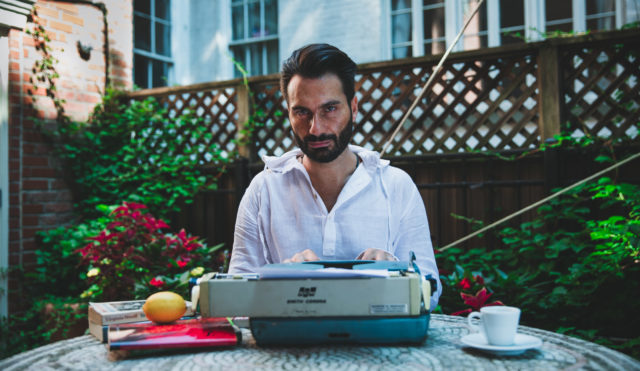Today’s social media platforms bring us into contact with so many interesting people. Some compel you to want to know more about them beyond the photos and interesting content they post. One of those people is Tommaso Cartia. What sets him apart from others, beyond his interesting posts, is his support for his fellow journalists. Although he is always working and posting his own intriguing projects, he always takes the time to acknowledge others and their projects, showing a genuine interest in their work. In this day and age of self-promotion and selfies, this is a unique and endearing quality.
Cartia’s family is from Scoglitti, a small fishing town in Sicily located in the area of the Baroque towns, UNESCO World Heritage sites. Inspired by his grandfather, a professional fisherman who traveled often to New York City, Cartia first moved to there in 2008 to pursue his Masters degree in Creative Writing and Film Studies at the New York Film Academy. Then three years ago, he was offered a position with the magazine and website, i-Italy. That experience served as a strong foundation upon which he has built a promising career interviewing and also representing some of the greatest Italian talent to arrive on American shores.
We recently chatted with Cartia about a number of relevant topics. Since he has interviewed so many Italian filmmakers promoting their projects in New York, we also asked him about contemporary Italian cinema and how it’s evolving to mirror Italy’s ever-changing society and social issues.
Tell me about your work as a journalist in NYC.
I started working as a journalist here in NY for the i-Italy Network, directed by Letizia Airos, who first believed in my potential and gave me my first concrete opportunity here. I will be always thankful to her. It’s been almost three years now and I then moved on working more as a freelancer. I recently started a collaboration with La Voce di NY, brilliantly directed by Stefano Vaccara. These years have been incredible. I had the chance to interview personalities that I would have never even dreamt to encounter in my life like, Actresses Gina Lollobrigida and Valeria Golino, Margherita Buy, Pulitzer Winner Author Michael Cunningham, Writer Erica Jong, Academy Award Nominee Director Gianfranco Rosi, Consul General of Italy in New York Francesco Genuardi, Eataly US CEO Nicola Farinetti, New York Restaurant Owner of Il Gattopardo Group Gianfranco Sorrentino, to name a few. I also worked as a co-writer and as a production coordinator for #TheItalianMentor – a TV Show hosted by Gabriella Carlucci – a familiar face on Italian TV. But that’s the magic of this city where all of the big artists and personalities of the world pass by at least once in their lives to leave here a little bit of the beauty of their art, and New York knows how to exalt beauty.
What are your thoughts on contemporary Italian cinema?
I think that contemporary Italian cinema has finally found more confidence in being really contemporary. Or at least there’s more confidence in showing that to an international audience and to show them that our cinema is not just the cinema of neorealism even though of course it is an aesthetic that will always be a part of our filmmaking. A perfect example is Alice Rohrwacher who is finally getting the recognition that she deserves here in the U.S. Her cinema is contemporary and at the same time, timeless. Movies such as “Happy as Lazzaro,” “The Wonders,” or my favorite, “Heavenly Body,” represent stories that are part of our mythology and folklore but accented with modern themes, characters and new urban landscapes.
Do you feel that contemporary cinema is representative of what is happening in Italy?
As I was saying about Rohrwacher’s work, we are sons and daughters of the Romans, of the Greeks, our beauty and our symbology will be always rooted in that Mediterranean aesthetic. And that’s the magic of our land that subliminally speaks of those myths, by just looking at it. How that past still converses with the advent of the digital and cosmopolitan world I guess is part of the secret of the beauty of new Italian movies, part neorealism, part melodrama, part modern times. It is evident in the architectural construction of Paolo Sorrentino’s movies, for example. Even though his camera work is definitely modern and contemporary, he still plays with archetypal symbols. You can find that dichotomy also in Luca Guadagnino’s movies, they are still neorealistic, melodramatic but you can tell there is a modern, fearless sentiment to his storytelling. One of the most contemporary Italian movies that I’ve seen recently is “Sicilian Ghost Story” by Fabio Grassadonia and Antonio Piazza. I would say it is contemporary, though the story is filled again with archetypes, myths and magical realism. But it recounts the true story of the brutal killing of an innocent kid kept prisoner by the mafia in Sicily. The aesthetic is definitely modern and the filmmaking is reminiscent of a Guillermo del Toro movie. Still, we are romantic in the way we Italians tell stories, and the land is always a protagonist with its lyrical power. I like to think that our cinema is still very recognizable. Even though our stories have changed and our filmmaking has changed in terms of techniques, our way of telling stories is still universal.
Have you noticed that Americans are more interested in Italian cinema now than perhaps five or ten years ago? If so, why do you think there is more interest?
I think it is because of what I was saying before. Italian directors are feeling the times we are living and that’s reflecting in our movies, but also the distributors are more willing to invest in our cinema and bring it to the international audience. Even though we are far away from other cinema powerhouses such as France, America and Asia, the international audience is falling back in love with Italian cinema. We are still neorealistic, melodramatic and imaginary, but we are wearing a more modern vest and we are telling new stories of our Italy in a very critical period for our country. I feel we want to go back to our roots, and I think we are speaking an international language. The world needs to go back to basics and rediscover its past in order to write a brighter, more solid future. There’s too much turmoil, too much confusion. Arts can serve the purpose to open our minds, to rest our fears, to empower ourselves, to learn from our land and ancestors. That’s what I think Italian cinema is telling us today.
Visit Tommaso Cartia online at https://www.thedigitalpoet.net and check out his new editorial project, The Digital Poet.
 Fra Noi Embrace Your Inner Italian
Fra Noi Embrace Your Inner Italian







